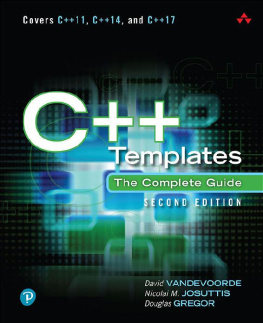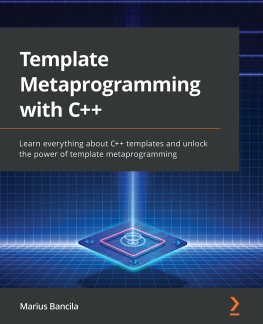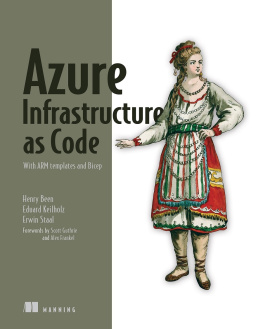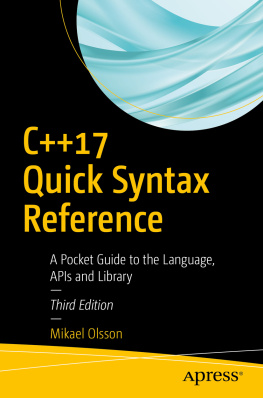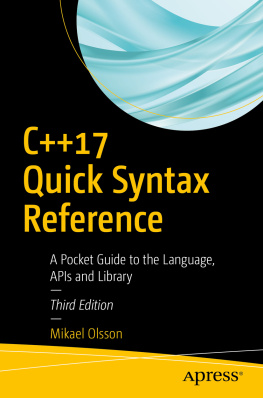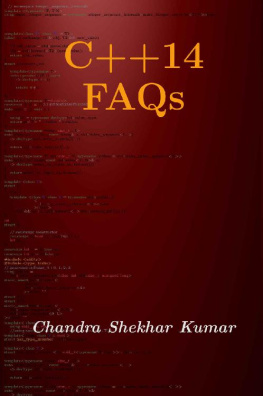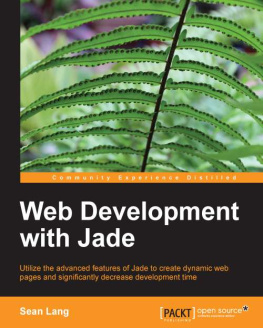C++ Templates
The Complete Guide
Second Edition
David Vandevoorde
Nicolai M. Josuttis
Douglas Gregor

Boston Columbus Indianapolis New York San Francisco Amsterdam Cape Town Dubai London Madrid Milan Munich Paris Montreal Toronto Delhi Mexico City So Paulo Sydney Hong Kong Seoul Singapore Taipei Tokyo
Many of the designations used by manufacturers and sellers to distinguish their products are claimed as trademarks. Where those designations appear in this book, and the publisher was aware of a trademark claim, the designations have been printed with initial capital letters or in all capitals.
The authors and publisher have taken care in the preparation of this book, but make no expressed or implied warranty of any kind and assume no responsibility for errors or omissions. No liability is assumed for incidental or consequential damages in connection with or arising out of the use of the information or programs contained herein.
For information about buying this title in bulk quantities, or for special sales opportunities (which may include electronic versions; custom cover designs; and content particular to your business, training goals, marketing focus, or branding interests), please contact our corporate sales department at or (800) 382-3419.
For government sales inquiries, please contact .
For questions about sales outside the U.S., please contact .
Visit us on the Web: informit.com/aw
Library of Congress Catalog Number: 2017946531
Copyright 2018 Pearson Education, Inc.
This book was typeset by Nicolai M. Josuttis using the LATEX document processing system. All rights reserved. Printed in the United States of America. This publication is protected by copyright, and permission must be obtained from the publisher prior to any prohibited reproduction, storage in a retrieval system, or transmission in any form or by any means, electronic, mechanical, photocopying, recording, or likewise. For information regarding permissions, request forms and the appropriate contacts within the Pearson Education Global Rights & Permissions Department, please visit www.pearsoned.com/permissions/.
ISBN-13: 978-0-321-71412-1
ISBN-10: 0-321-71412-1
1 17
To Alessandra & Cassandra
David
To those who care for people and mankind
Nico
To Amy, Tessa & Molly
Doug
Contents
Preface
The notion of templates in C++ is over 30 years old. C++ templates were already documented in 1990 in The Annotated C++ Reference Manual (ARM; see [EllisStroustrupARM]), and they had been described before then in more specialized publications. However, well over a decade later, we found a dearth of literature that concentrates on the fundamental concepts and advanced techniques of this fascinating, complex, and powerful C++ feature. With the first edition of this book, we wanted to address this issue and decided to write the book about templates (with perhaps a slight lack of humility).
Much has changed in C++ since that first edition was published in late 2002. New iterations of the C++ standard have added new features, and continued innovation in the C++ community has uncovered new template-based programming techniques. The second edition of this book therefore retains the same goals as the first edition, but for Modern C++.
We approached the task of writing this book with different backgrounds and with different intentions. David (aka Daveed), an experienced compiler implementer and active participant of the C++ Standard Committee working groups that evolve the core language, was interested in a precise and detailed description of all the power (and problems) of templates. Nico, an ordinary application programmer and member of the C++ Standard Committee Library Working Group, was interested in understanding all the techniques of templates in a way that he could use and benefit from them. Doug, a template library developer turned compiler implementer and language designer, was interested in collecting, categorizing, and evaluating the myriad techniques used to build template libraries. In addition, we all wanted to share this knowledge with you, the reader, and the whole community to help to avoid further misunderstanding, confusion, or apprehension.
As a consequence, you will see both conceptual introductions with day-to-day examples and detailed descriptions of the exact behavior of templates. Starting from the basic principles of templates and working up to the art of template programming, you will discover (or rediscover) techniques such as static polymorphism, type traits, metaprogramming, and expression templates. You will also gain a deeper understanding of the C++ standard library, in which almost all code involves templates.
We learned a lot and we had much fun while writing this book. We hope you will have the same experience while reading it. Enjoy!
Acknowledgments for the Second Edition
Writing a book is hard. Maintaining a book is even harder. It took us more than five yearsspread over the past decadeto come up with this second edition, and it couldnt have been done without the support and patience of a lot of people.
First, wed like to thank everyone in the C++ community and on the C++ standardization committee. In addition to all the work to add new language and library features, they spent many, many hours explaining and discussing their work with us, and they did so with patience and enthusiasm.
Part of this community also includes the programmers who gave feedback for errors and possible improvement for the first edition over the past 15 years. There are simply too many to list them all, but you know who you are and were truly grateful to you for taking the time to write up your thoughts and observations. Please accept our apologies if our answers were sometimes less than prompt.
Wed also like to thank everyone who reviewed drafts of this book and provided us with valuable feedback and clarifications. These reviews brought the book to a significantly higher level of quality, and it again proved that good things need the input of many wise guys. For this reason, huge thanks to Steve Dewhurst, Howard Hinnant, Mikael Kilpelainen, Dietmar Khl, Daniel Krgler, Nevin Lieber, Andreas Neiser, Eric Niebler, Richard Smith, Andrew Sutton, Hubert Tong, and Ville Voutilainen.
Of course, thanks to all the people who supported us from Addison-Wesley/Pearson. These days, you can no longer take professional support for book authors for granted. But they were patient, nagged us when appropriate, and were of great help when knowledge and professionalism were necessary. So, many thanks to Peter Gordon, Kim Boedigheimer, Greg Doench, Julie Nahil, Dana Wilson, and Carol Lallier.
A special thanks goes to the LaTeX community for a great text system and to Frank Mittelbach for solving our LATEX issues (it was almost always our fault).
Davids Acknowledgments for the Second Edition
This second edition was a long time in the waiting, and as we put the finishing touches to it, I am grateful for the people in my life who made it possible despite many obligations vying for attention. First, Im indebted to my wife (Karina) and daughters (Alessandra and Cassandra), for agreeing to let me take significant time out of the family schedule to complete this edition, particularly in the last year of work. My parents have always shown interest in my goals, and whenever I visit them, they do not forget this particular project.
Clearly, this is a technical book, and its contents reflect knowledge and experience about a programming topic. However, that is not enough to pull off completing this kind of work. Im therefore extremely grateful to Nico for having taken upon himself the management and production aspects of this edition (in addition to all of his technical contributions). If this book is useful to you and you run into Nico some day, be sure to tell him thanks for keeping us all going. Im also thankful to Doug for having agreed to come on board several years ago and to keep going even as demands on his own schedule made for tough going.

